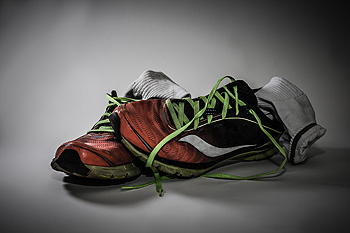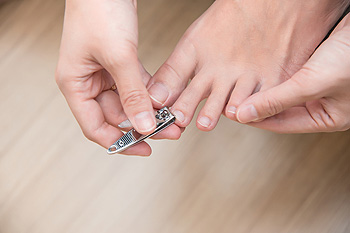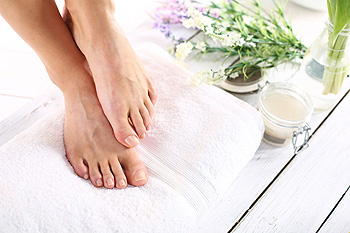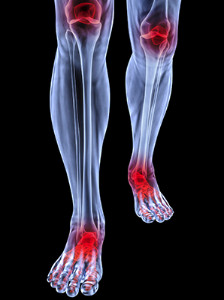Middlefield (860) 349-8500
Wallingford (203) 294-4977
Middlefield (860) 349-8500
Wallingford (203) 294-4977
 Sweaty feet is a common condition that most people find uncomfortable, and it’s often associated with an unpleasant odor in addition to a soggy feeling in the shoes and socks. Wet feet often lead to problems such as fungal infections, usually stemming from bacteria that live in warm and moist areas. Synthetic shoes socks may possibly make this condition worse, so it’s advised to wear cotton socks and leather shoes or sandals. It’s important to change your socks often and walking barefoot whenever possible may also help allow your feet to breathe. Please consult with a podiatrist if you have questions about hyperhidrosis of the feet.
Sweaty feet is a common condition that most people find uncomfortable, and it’s often associated with an unpleasant odor in addition to a soggy feeling in the shoes and socks. Wet feet often lead to problems such as fungal infections, usually stemming from bacteria that live in warm and moist areas. Synthetic shoes socks may possibly make this condition worse, so it’s advised to wear cotton socks and leather shoes or sandals. It’s important to change your socks often and walking barefoot whenever possible may also help allow your feet to breathe. Please consult with a podiatrist if you have questions about hyperhidrosis of the feet.
If you are suffering from hyperhidrosis contact Dr. Gordon Fosdick of Affiliated Foot Care Center. Our doctor can provide the care you need to attend to all of your foot and ankle needs.
Hyperhidrosis of the Feet
Hyperhidrosis is a rare disorder that can cause people to have excessive sweating of their feet. This can usually occur all on its own without rigorous activity involved. People who suffer from hyperhidrosis may also experience sweaty palms.
Although it is said that sweating is a healthy process meant to cool down the body temperature and to maintain a proper internal temperature, hyperhidrosis may prove to be a huge hindrance on a person’s everyday life.
Plantar hyperhidrosis is considered to be the main form of hyperhidrosis. Secondary hyperhidrosis can refer to sweating that occurs in areas other than the feet or hands and armpits. Often this may be a sign of it being related to another medical condition such as menopause, hyperthyroidism and even Parkinson’s disease.
In order to alleviate this condition, it is important to see your doctor so that they may prescribe the necessary medications so that you can begin to live a normal life again. If this is left untreated, it is said that it will persist throughout an individual’s life.
A last resort approach would be surgery, but it is best to speak with your doctor to find out what may be the best treatment for you.
If you have any questions please feel free to contact our offices located in Middlefield and Wallingford, CT . We offer the newest diagnostic and treatment technologies for all your foot and ankle needs.
 Many diabetics incur nerve damage, often making it difficult to feel sores, blisters, or cuts. Checking the feet nightly can be helpful in preventing infections; however, it may be difficult for the diabetic patient to check their feet due to arthritis, diminished eyesight or possible back problems. Having someone check the feet daily or using a small mirror may be beneficial in observing the soles of the feet. Symptoms to look for include any type of irritation, redness, or callus; additionally, paying extra attention to the toes and the ball of the foot is crucial in noticing foot ulcers. Moisturizing is necessary in preventing dry skin, which may cause cracked heels that can become infected. If an electric blanket is used, it may be wise to not use it because of reduced feeling in the feet. Additionally, ice packs can cause numbness in the feet and may not be recommended for this reason. Trimming the toenails is important to do with clippers that are designed for toenails, thereby preventing injuries to the foot. Please consult your podiatrist for advice in keeping your feet healthy
Many diabetics incur nerve damage, often making it difficult to feel sores, blisters, or cuts. Checking the feet nightly can be helpful in preventing infections; however, it may be difficult for the diabetic patient to check their feet due to arthritis, diminished eyesight or possible back problems. Having someone check the feet daily or using a small mirror may be beneficial in observing the soles of the feet. Symptoms to look for include any type of irritation, redness, or callus; additionally, paying extra attention to the toes and the ball of the foot is crucial in noticing foot ulcers. Moisturizing is necessary in preventing dry skin, which may cause cracked heels that can become infected. If an electric blanket is used, it may be wise to not use it because of reduced feeling in the feet. Additionally, ice packs can cause numbness in the feet and may not be recommended for this reason. Trimming the toenails is important to do with clippers that are designed for toenails, thereby preventing injuries to the foot. Please consult your podiatrist for advice in keeping your feet healthy
Diabetic foot care is important in preventing foot ailments such as ulcers. If you are suffering from diabetes or have any other concerns about your feet, contact Dr. Gordon Fosdick from Affiliated Foot Care Center. Our doctor can provide the care you need to keep you pain-free and on your feet.
Diabetic Foot Care
Diabetes affects millions of people every year. The condition can damage blood vessels in many parts of the body, especially the feet. Because of this, taking care of your feet is essential if you have diabetes, and having a podiatrist help monitor your foot health is highly recommended.
The Importance of Caring for Your Feet
Patients with diabetes should have their doctor monitor their blood levels, as blood sugar levels play such a huge role in diabetic care. Monitoring these levels on a regular basis is highly advised.
It is always best to inform your healthcare professional of any concerns you may have regarding your feet, especially for diabetic patients. Early treatment and routine foot examinations are keys to maintaining proper health, especially because severe complications can arise if proper treatment is not applied.
If you have any questions please feel free to contact our offices located in Middlefield and Wallingford, CT . We offer the newest diagnostic and treatment technologies for all your foot and ankle needs.
 Our feet are susceptible to ailments just as the rest of our body is. Here are some more common ones and whether they are serious or not. Verrucas are warts that form on the bottom of our feet due to human papillomavirus. Verrucas are contagious but are generally not a serious medical issue. Athlete’s foot is a different infection of the foot that is caused by a fungus rather than a virus. Similar to verrucas, athlete’s foot is also generally not a serious health concern and will go away. Toenail fungus, a fungal infection of the toenails, is also generally not a serious health concern but can cause embarrassment for those who have it. An ingrown toenail occurs when the nail begins to grow into the skin along the sides of the nail and can cause discomfort. While an ingrown toenail can be taken care of at home, it is recommended to see a podiatrist as they can treat it safely. Bunions are bony bumps that form at the base of the big toe and can cause pain and discomfort. While podiatrists will attempt to treat a bunion with nonsurgical options, in some cases, surgery may be deemed necessary. While there are many more foot conditions, this is meant as a brief overview of some of them. While most of the ones listed here are generally not dangerous, it’s not a bad idea to see a podiatrist as they can provide better treatments and help your feet heal faster. Finally, if you are diabetic, it is strongly advised that you see a podiatrist for any foot-related abnormality.
Our feet are susceptible to ailments just as the rest of our body is. Here are some more common ones and whether they are serious or not. Verrucas are warts that form on the bottom of our feet due to human papillomavirus. Verrucas are contagious but are generally not a serious medical issue. Athlete’s foot is a different infection of the foot that is caused by a fungus rather than a virus. Similar to verrucas, athlete’s foot is also generally not a serious health concern and will go away. Toenail fungus, a fungal infection of the toenails, is also generally not a serious health concern but can cause embarrassment for those who have it. An ingrown toenail occurs when the nail begins to grow into the skin along the sides of the nail and can cause discomfort. While an ingrown toenail can be taken care of at home, it is recommended to see a podiatrist as they can treat it safely. Bunions are bony bumps that form at the base of the big toe and can cause pain and discomfort. While podiatrists will attempt to treat a bunion with nonsurgical options, in some cases, surgery may be deemed necessary. While there are many more foot conditions, this is meant as a brief overview of some of them. While most of the ones listed here are generally not dangerous, it’s not a bad idea to see a podiatrist as they can provide better treatments and help your feet heal faster. Finally, if you are diabetic, it is strongly advised that you see a podiatrist for any foot-related abnormality.
Everyday foot care is very important to prevent infection and other foot ailments. If you need your feet checked, contact Dr. Gordon Fosdick from Affiliated Foot Care Center. Our doctor can provide the care you need to keep you pain-free and on your feet.
Everyday Foot Care
Often, people take care of their bodies, face and hair more so than they do for their feet. But the feet are a very important aspect of our bodies, and one that we should pay more attention to. Without our feet, we would not be able to perform most daily tasks.
It is best to check your feet regularly to make sure there are no new bruises or cuts that you may not have noticed before. For dry feet, moisturizer can easily be a remedy and can be applied as often as necessary to the affected areas. Wearing shoes that fit well can also help you maintain good foot health, as well as making it easier to walk and do daily activities without the stress or pain of ill-fitting shoes, high heels, or even flip flops. Wearing clean socks with closed shoes is important to ensure that sweat and bacteria do not accumulate within the shoe. Clean socks help to prevent Athlete’s foot, fungi problems, bad odors, and can absorb sweat.
If you have any questions please feel free to contact our offices located in Middlefield and Wallingford, CT . We offer the newest diagnostic and treatment technologies for all your foot and ankle needs.
 Rheumatoid arthritis is a chronic inflammatory disease that causes swelling in the heel and joints and can be very painful. It commonly affects the small joints of the feet. Corns and hammertoes can develop, and bunions may be exacerbated due to the weakened ligaments in the foot. Common symptoms that may occur include clicking and popping sounds, locked joints due to stiffness, and difficulty walking. Plantar fasciitis can also develop because the tissue that runs along the bottom of the foot becomes inflamed. Stretching exercises, which increases the flexibility of the foot and toes, can help bring some relief. Additionally, wearing comfortable and supportive shoes may also make your feet feel better. Avoid poorly-fitted footwear such as high heels, as they increase pressure on the feet. Please consult with a podiatrist for a proper diagnosis if you have pain in your feet. Podiatrists are trained to handle arthritis in the foot and ankle and will be able to help with the condition.
Rheumatoid arthritis is a chronic inflammatory disease that causes swelling in the heel and joints and can be very painful. It commonly affects the small joints of the feet. Corns and hammertoes can develop, and bunions may be exacerbated due to the weakened ligaments in the foot. Common symptoms that may occur include clicking and popping sounds, locked joints due to stiffness, and difficulty walking. Plantar fasciitis can also develop because the tissue that runs along the bottom of the foot becomes inflamed. Stretching exercises, which increases the flexibility of the foot and toes, can help bring some relief. Additionally, wearing comfortable and supportive shoes may also make your feet feel better. Avoid poorly-fitted footwear such as high heels, as they increase pressure on the feet. Please consult with a podiatrist for a proper diagnosis if you have pain in your feet. Podiatrists are trained to handle arthritis in the foot and ankle and will be able to help with the condition.
Because RA affects more than just your joints, including the joints in your feet and ankles, it is important to seek early diagnosis from your podiatrist if you feel like the pain in your feet might be caused by RA. For more information, contact Dr. Gordon Fosdick of Affiliated Foot Care Center. Our doctor will assist you with all of your podiatric concerns.
What Is Rheumatoid Arthritis?
Rheumatoid Arthritis (RA) is an autoimmune disorder in which the body’s own immune system attacks the membranes surrounding the joints. Inflammation of the lining and eventually the destruction of the joint’s cartilage and bone occur, causing severe pain and immobility.
Rheumatoid Arthritis of the Feet
Although RA usually attacks multiple bones and joints throughout the entire body, almost 90 percent of cases result in pain in the foot or ankle area.
Symptoms
Diagnosis
Quick diagnosis of RA in the feet is important so that the podiatrist can treat the area effectively. Your doctor will ask you about your medical history, occupation, and lifestyle to determine the origin of the condition. Rheumatoid Factor tests help to determine if someone is affected by the disease.
If you have any questions please feel free to contact our offices located in Middlefield and Wallingford, CT . We offer the newest diagnostic and treatment technologies for all your foot and ankle needs.